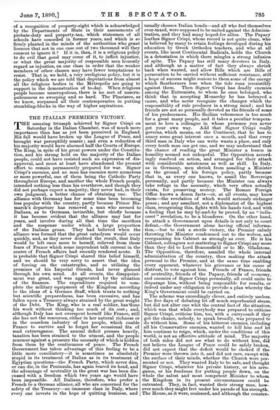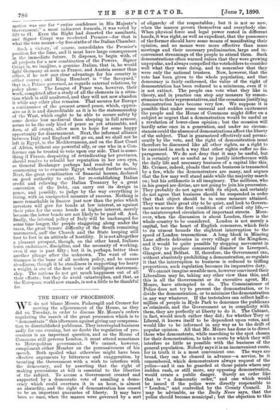THE ITALIAN PREMIER'S VICTORY. T HE amazing triumph achieved by Signor
Crispi on Saturday in the Italian Chamber, was of much more importance than has as yet been perceived in England. His fall would have broken up the League of Peace, and brought war perceptibly nearer ; and even a reduction of his majority would have alarmed half the Courts of Europe. The King, in spite of his great powers under the Constitu- tion, and his strong hold on the majority of the Italian people, could not have resisted such an expression of dis- approval, and must at least have abandoned the present effort to remain permanently prepared for war. Signor Crispi's enemies, and no man has enemies more numerous or more powerful, one of them being the Catholic Party throughout Europe, and another the whole French people, intended nothing less than his overthrow, and though they did not perhaps expect a majority, they never had, in their own judgment, a better chance of obtaining one. The alliance with Germany has for some time been becoming less popular with the country, partly because Prince Bis- marck's departure has removed a man who seemed to Italians, as to Germans, invincible, but chiefly because it has become evident that the alliance may last for years, and involve during all that time the sacrifices and the suspense under which a large proportion of the Italians groan. They had believed when the alliance was formed that the great cataclysm would occur quickly, and, as they never doubted the result, that Italy would be left once more to herself, relieved from those fears of France which some imprudent talk current in the centre of French affairs had recently rendered acute. It is probable that Signor Crispi shared this belief himself, and we should be very sorry to assert that the idea of forcing on the catastrophe, and so utilising the promises of his Imperial friends, had never glanced through his own mind. At all events, the disappoint- ment was great, and was aggravated by the situation of the finances. The expenditure required to com- plete the military equipment of the Kingdom according to the ideas of a German Staff, which trusts to nothing but scientific preparedness, has been excessive, and has fallen upon a Treasury always strained by the great weight of the Debt. The King, who is a real soldier, has 'done his work without thinking too much of its cost ; and, although Italy has not overspent herself like France, still she has not the resources, either in her natural richness or in the ceaseless industry of her people, which enable France to survive and to forget her occasional fits of mad extravagance. The annual deficit presses heavily, taxation has been strained to the utmost, and the people murmur against a pressure the necessity of which is hidden from them by the continuance of peace. The French Government has taken advantage of this feeling to be a little more conciliatory—it is sometimes as absolutely stupid in its treatment of Italian as in its treatment of Egyptian questions—the French Party, which never dies, or can die, in the Peninsula, has again reared its head, and the advantage of neutrality in the great war has been dis- cussed with a freedom which two years ago would have been impossible. All Italians, therefore, who prefer a French to a German affiance, all who are concerned for the safety of the Treasury—an immense class in Italy, where every one invests in the hope of quitting business, and usually chooses Italian bonds—and all who feel themselves over-taxed, were supposed to be united against the Adminis- tration, and they had many hoped-for allies. The Papacy loathes Signor Crispi, whose record is not quite clean, who is believed by many to retain feelings developed during his education by Greek Orthodox teachers, and who at all events, like most Continental Radicals, holds the Church in a detestation in which there mingles a strong infusion of spite. The Papacy has still many devotees in Italy, and although as a matter of fact they always shrink back when wanted, and allow Bills which are Bills of persecution to be carried without sufficient resistance, still a hope of success might restore to them some of the energy which Southerners lose when the tide runs irresistibly against them. Then Signor Crispi has deadly enemies among the Extremists, to whom he once belonged, who think that in accepting Monarchy he has betrayed a cause, and who never recognise the changes which the responsibility of rule produces in a strong mind ; and. his friends are not so personally devoted as the friends of some of his predecessors. His Sicilian vehemence is too much for a great many people, and it takes a peculiar tempera- ment to love a colleague in whose presence you never get your own way. Add that Signor Crispi really governs, which means, on the Continent, that he has to annoy some great interest once a month, and that every third man in Italy who can write wants a place, and only every tenth man can get one, and we may understand that the chance of reading the great Minister a lesson in humility seemed not unhopeful. The Opposition accord- ingly resolved on action, and arranged for their attack with considerable astuteness as well as skill. In Italy, as in Germany, men shrink from assailing a Minister on the ground of his foreign policy, partly because that is, as every one knows, to assail the Sovereign personally, and partly because the Minister can always take refuge in the necessity, which very often actually exists, for preserving secrecy. The Roman Foreign Office knows a dozen facts—or, at all events, may know them—the revelation of which would seriously endanger peace ; and any assailant, not a diplomatist of the highest class, recognising this, fights with his hands tied, and with a feeling that he may by-and-by be proved, by an " indis- creet " revelation, to be a blunderer. On the other hand, to attack a Government upon details is not only to court defeat,—the Government alone having official informa- tion,—but to risk a sterile victory, the Premier calmly throwing the Minister condemned out to the wolves, and reorganising his Cabinet as strongly as ever. He is his Cabinet, colleagues not mattering to Signor Crispi any more than they did to Lord Beaconsfield or to Mr. Gladstone_ The Opposition, therefore, assailed the whole internal administration of the country, thus making the attack personal to the Premier, and at the same time enabling every opponent, whatever his grievance or his cause of distrust, to vote against him. Friends of France, friends_ of neutrality, friends of the Papacy, friends of economy, and enemies of Signor Crispi personally, all could unite to. disparagehim, without being responsible for results, or indeed under any obligation to provide a plan whereby the. King's Government could be carried on.
The scheme was exceedingly clever, and entirely useless. The five days of debating let off much superheated steam, but did not alter one whit the central fact of the situation, which was that while everybody was prepared to criticise. Signor Crispi, criticise him, too, with a currycomb if they got the chance, nobody, to speak broadly, was prepared to do without him. Some of his bitterest enemies, including all his Conservative enemies, wanted to kill him and let him continue to reign, which, under the conditions of this world, is not an effective attitude of mind. The majority of both sides did not see what to do without him, did not believe the League of Peace could be safely broken, did not expect that the deficit would be choked if the Premier were thrown into it, and did not care, except with the surface of their minds, whether the Church were per. secuted or not. They wanted Italy to be safe, and thought Signor Crispi, whatever his private history, or his arro- gance, or his fondness for putting people down, on the whole the safest and most competent Minister to whom the Kingdom in its present circumstances could be entrusted. They, in fact, wanted their strong man, how- ever much they might fret under his parade of his strength. The House, as it were, coalesced, and although the counter.. motion was one for "entire confidence in His Majesty's Government," a most indiscreet formula, it was voted by 329 to 61. Even the Right had deserted the assailants, and Signor Crispi was re-elected Premier—for that is what the vote meant—by five-sixths of the Italian Chamber.
Such a victory; of course, consolidates the Premier's position for the time, and it must have large consequences in the immediate. future. It disposes, to begin with, of all projects for a new combination of the Powers. Signor Crispi is, we imakine, a genuine Italian, that is, he would fight Germany as.soon as France, and Austria sooner than either, if he saW any clear advantage for his country in either course ; and King Humbert is "the Savoyard," that is, a Prince governed, as regards external relations, by policy alone. The League of Peace was, however, their work, completed after a study of all the elements in a situa- tion which is still unaltered, and they will not now abandon it while any other plan remains. That secures for Europe a continuance of the present armed peace, which, oppres- sive as it is and discreditable as it is to the statesmanship of the West, which ought to be able to secure safety by some device lesEr medimval than sleeping in full armour, seems to be the only kind of peace as yet attainable, and does, at all events, allow men to hope for some happy• opportunity for disarmament. Next, the informal alliance between Italy and England will go on, and, we shall not be left in Egypt, in the Mediterranean, and on the East Coast of Africa, without one powerful ally, or one who in a Con- ference can be trusted to vote upon our side. That is some- thing if France, despairing of revindicating her provinces, should resolve to rebuild her reputation in her own eyes, as General Boulanger perhaps had resolved to do, by summoning us to evacuate Egypt without further notice. Next, the great combination of financial houses, declared on good authority to exist, for re-establishing Italian credit and relieving the Italian Treasury by a great conversion of the Debt, can carry out its design in peace, and possibly, to judge by the way everything is rising, with an unexpected measure of success. Nothing is more remarkable in finance just now than the price which investors will give for bonds at low interest, as against their price for the same bonds at higher interest, merely because the lower bonds are not likely to be paid off. And, finally, the internal policy of Italy will be unchanged for some time longer, the people staggering along under the taxes, the great stenure difficulty of the South remaining unremoved, ane the Church and the State keeping still foot to foot in an attitude of hostility. It is not altogether a pleasant prbspect, though, on the other hand, Italians learn endurance, 'discipline, and the necessity of working, even if one is past fifty ; but it is, perhaps, better than another plunge after the unknown. The want of con- tinuance is the bane of all modern policy, and to ensure steadiness, though it be steadiness in supporting too heavy a weight, is one of the first tests of intelligent statesman- ship. The nations do not get much happiness out of all their efforts ; but they do avoid catastrophes, and that, as the European world now stands, is not a little to be thankful for.





































 Previous page
Previous page